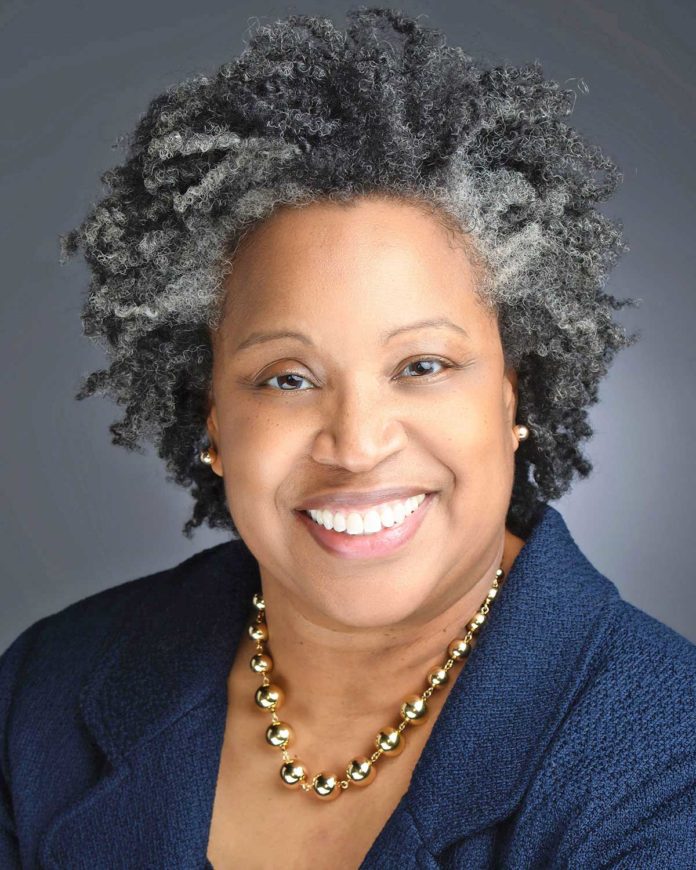Philadelphia College of Osteopathic Medicine (PCOM) welcomed Adrianne Jones as its new chief admissions officer on April 27. She will be in charge of enrollment for programs across the college’s three locations.
Jones, an out lesbian, comes to this new role with 25 years of experience in admissions and student counseling in higher education settings, including her role as director of admissions at the University of St. Augustine for Health Sciences in Florida. She received her master’s in liberal studies, humanities and social sciences from Southern Methodist University in Dallas, Texas, and her bachelor’s in English and history from Southwestern University in Georgetown, Texas.
As a member of the LGBTQ+ community who has worked with LGBTQ students in her past role as an academic advisor, queer inclusivity is one of many characteristics that Jones values in an academic institution such as PCOM.
“When you talk about the value that a place like PCOM places on the LGBTQ experience and students, it’s having that whole perspective about equity,” Jones said. “It’s also about diversity and inclusion, but it’s on a grander scale to actually have done things like a climate survey, to actively go out and recruit different members of the community, and embracing all of that is not an easy task. Everyone’s making that commitment, they’re working on being an ally, or they are an ally, or they’re part of the community.”
PCOM’s Doctor of Osteopathic Medicine (DO) degree was another aspect that drew Jones to the college because both she and her wife have experienced the DO approach to medicine. The hands-on training and treatment that’s part of the DO philosophy are called Osteopathic Manipulative Medicine, Jones said.
“PCOM in osteopathic medicine ties together the hands to diagnose and treat along with the mind,” she said. “I’m hopefully going to be a conduit and facilitator for students to join PCOM. I just absolutely love the whole person approach to looking at all of the ills that could be going on with you. It includes even societal things –– how much time ergonomically you’re not in a good posture at your desk, the stress of your work environment and what you’re eating.”
In addition to a doctorate degree in osteopathic medicine, PCOM also offers doctorate degrees in educational psychology, pharmacy, physical therapy and psychology, and a wealth of graduate degrees including biomedical sciences and mental health counseling.
While Jones interviewed for the position at PCOM, she was asked about her commitment to diversity and discussed the work she’d like to do at the college.
“It’s not an assumption that if you’re in these different groups that you’re going to be doing anything,” she said. “I’m excited to actively get involved. I want to be able to stand for those communities.” She added that some of her future colleagues were eager for her to start the job. “I have never ever been welcomed into a community with such joy,” she added.
PCOM President and Chief Executive Officer Jay S. Feldstein, DO ‘81, echoed this sentiment in a press release.
“Adrianne’s experience in the health education field, paired with her proven ability to improve admissions processes to ensure the best possible candidates are admitted to PCOM, make her the ideal fit to lead our Office of Admissions,” he said.
Jones is also in the process of getting her Ph.D. from Walden University, for which she is writing a dissertation titled “Sponsorship Experiences of LGBTQ African American Women Executives in Higher Education Leadership.”
“This has only just been recently in 10 or 12 years that a presidential group of LGBTQ+ [individuals] were identified in admissions,” she said. “I knew a number of gay people in this profession, but none were gathered in an affinity group outside our national organization. I was excited to find that as a resource; it drew me to think about the pathway to the executive level. It’s a hard enough journey for a woman of color, specifically an African American woman.”
Sponsorship, Jones explained, is the process in which an executive mentors a protégé and facilitates their path to progressing in their field.
“It’s a rite of passage somewhat,” Jones said. “It’s very hard to move into an executive position because women of color, gay and lesbian admissions professionals are working in the margins. I really wanted to hone in on looking at other African American presidents and deans and VPs to talk about the different journeys as a way to establish a pathway for others.”
In the same vein of perpetuating diversity in executive leadership in higher ed, Jones commented on how diversity and inclusivity are needed in the healthcare field.
“When you think about the disparities that are out there inpatient care, that’s documented research,” she said. “This is not news to us that the African American community is much more impacted by the coronavirus.” She discussed how bias in healthcare systems “impacts your well being, your psychological standing, your physical health. That’s why this is so critical to the community that the healthcare environment is out there in front, welcoming all. The whole public health initiative is on the verge of needing to be more inclusive to understand how this impacts not just the U.S., but our global community as well.”

